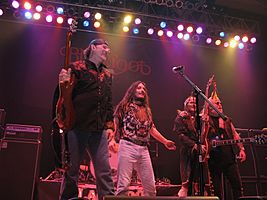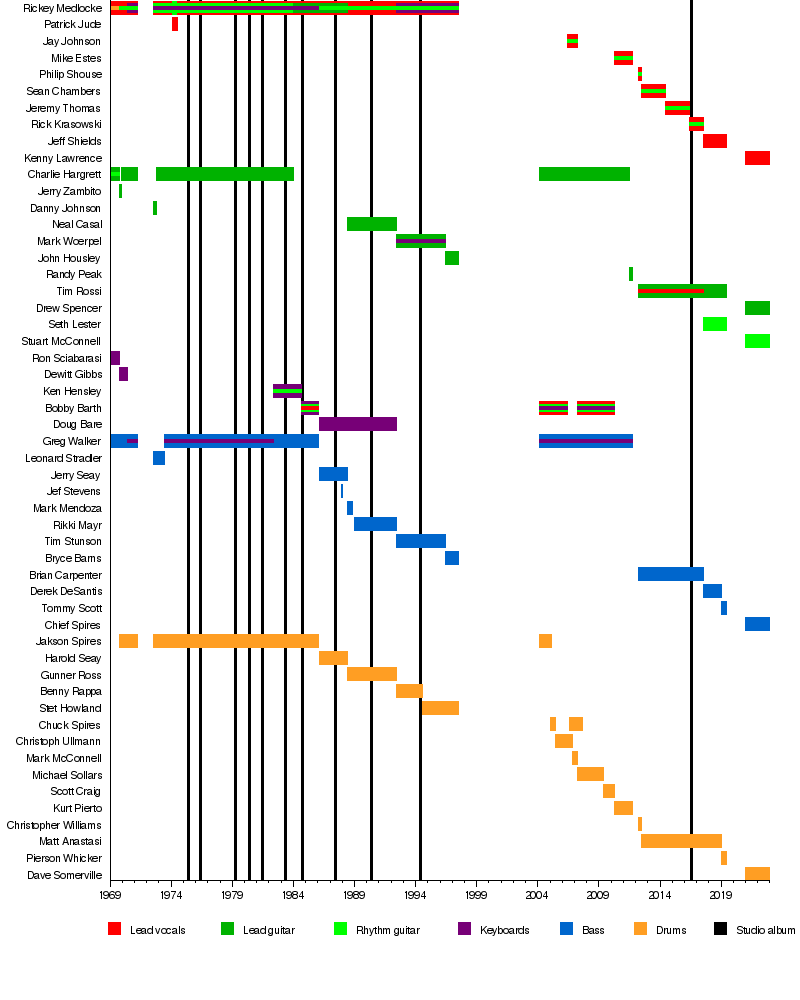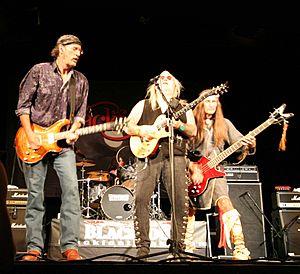Blackfoot (band) facts for kids
Quick facts for kids
Blackfoot
|
|
|---|---|

Blackfoot at Penn's Peak, Pennsylvania, in 2008
|
|
| Background information | |
| Also known as |
|
| Origin | Jacksonville, Florida, U.S. |
| Genres | |
| Years active | 1969–1997, 2004–present |
| Labels | |
| Associated acts |
|
Blackfoot is an American Southern rock band that started in Jacksonville, Florida, in 1969. They are known for their Southern rock style, but they also play hard rock. The band's most famous lineup included guitarist and singer Rickey Medlocke, guitarist Charlie Hargrett, bassist Greg T. Walker, and drummer Jackson Spires.
They released several popular albums in the 1970s and early 1980s. Some of their well-known albums are Strikes (1979), Tomcattin' (1980), and Marauder (1981).
Contents
Band History
How Blackfoot Started
In the spring of 1969, Rickey Medlocke and Greg T. Walker met Charlie Hargrett in Jacksonville. They formed a band called "Fresh Garbage." Medlocke played drums and sang, Walker played bass, Hargrett played guitar, and Ron Sciabarasi played keyboards. They often played at The Comic Book Club.
Later that year, Fresh Garbage broke up when Sciabarasi left the band. However, Medlocke, Walker, and Hargrett started a new band called "Hammer." Medlocke became the singer and guitarist. Jakson Spires joined on drums, along with DeWitt Gibbs on keyboards and Jerry Zambito on guitars. The band moved to Gainesville, Florida, to play as the house band at a popular bar called Dub's.
Around 1970, the band moved to Manhattan, New York. A friend helped them get a chance to move there.
Changing the Name to Blackfoot
In early 1970, the band learned there was another band called Hammer on the West Coast. So, they decided to change their name to Blackfoot. This new name honored the American Indian heritage of some of the band members. Jakson Spires had Cheyenne and Cherokee roots. Rickey Medlocke's father was Lakota Sioux and Blackfoot, and his mother's family was Creek and Cherokee. Greg "Two Wolf" Walker was part Eastern (Muskogee) Creek. Charlie Hargrett was the only member of the original group who was not of Native American descent.
When the band didn't get a record deal in New York, Gibbs left. Medlocke then started playing rhythm guitar full-time.
In 1971, Medlocke and Walker joined another famous band, Lynyrd Skynyrd. This meant Blackfoot stopped playing for a while. Charlie Hargrett played in other bands during this time. There was a short attempt to bring Blackfoot back in 1972, but Medlocke left again.
Reforming and Early Albums
In August 1972, Charlie Hargrett decided to move to North Carolina. He invited Medlocke, who had left Lynyrd Skynyrd, to restart Blackfoot. Leonard Stadler joined on bass, and Jakson Spires returned on drums. Danny Johnson joined as a second guitarist for a short time. Medlocke soon decided to be both the main singer and guitarist again.
In the summer of 1973, Stadler left the band due to health reasons. Greg T. Walker was then asked to rejoin.
By 1974, the band was back in Northern New Jersey. Medlocke had a problem with his voice and couldn't sing for a while. Another singer, Patrick Jude, joined the band briefly. Once Medlocke could sing again, Jude left. Blackfoot then sent their music to producers Jimmy Johnson and David Hood. These producers had worked with Medlocke and Walker before.
Blackfoot released their first album, No Reservations, in 1975 with Island Records. Their second album, Flyin' High, came out in 1976 with Epic Records. Both albums were produced by Johnson and Hood.
Rising to Fame
By late 1975, the band moved back to Gainesville, Florida. In 1977, they worked with Butch Stone, who managed the band Black Oak Arkansas. Blackfoot became the backing band for Ruby Starr, a singer who used to be a backup for Black Oak.
After working with Ruby Starr, Blackfoot met Al Nalli and Jay Frey, who helped them get a contract with Atco Records. Their album Blackfoot Strikes was recorded in Nalli's basement studio in Michigan. It was finished by January 1979 and became the band's most successful album. The song "Train, Train", written by Rickey's grandfather, became their first big hit. "Highway Song" was another popular song for them that year.
The band toured a lot in 1979. They even opened for the famous band The Who at the Pontiac Silverdome in Michigan. They released their next album, Tomcattin', in 1980. They continued with Marauder in 1981 and Highway Song in 1982.
Changes in the 1980s
In the early 1980s, Southern rock music became less popular with pop music fans. So, Blackfoot tried to change their style. They decided to add keyboards to the band again. Organist Ken Hensley from the band Uriah Heep joined in 1982 for their album Siogo. But this album didn't sell well. The band thought they needed to update their sound for the new MTV generation.
Charlie Hargrett left the band in January 1984. Their next album, Vertical Smiles, was recorded without him. This album also did not sell well. Ken Hensley left in late 1984 because he wasn't used to Blackfoot's busy touring schedule. Bobby Barth replaced him.
By December 1985, Blackfoot's popularity was fading, and they decided to stop playing. In February 1986, the band officially broke up. Rickey Medlocke decided to continue with new musicians. For their 1987 album, Rick Medlocke and Blackfoot, the new group tried a more radio-friendly 1980s rock sound.
In 1988, some members left, and new ones joined, including Mark Mendoza on bass. More changes happened in 1989.
The 1990s and Beyond
In 1990, a new album called Medicine Man was released. By 1992, Medlocke changed the band members again. He brought in guitarist Mark Woerpel, drummer Benny Rappa, and bassist Tim Stunson. Another new album, After the Reign, came out in 1994. This album, like Medicine Man, had some of the band's older style.
In 1996, Medlocke rejoined Lynyrd Skynyrd, this time as a guitarist. He continued to tour with Blackfoot until 1997, then stopped the band to focus on Lynyrd Skynyrd.
Concert recordings from 1983 were released in 1998 and 2000, letting fans hear the band from their most popular years.
Blackfoot Returns (2004-2011)
In 2004, Blackfoot started up again with original members Jakson Spires, Greg T. Walker, and Charlie Hargrett. Rickey Medlocke was busy with Lynyrd Skynyrd, so Bobby Barth became the lead singer. Sadly, Jakson Spires passed away in 2005. The band decided to keep going, and Christoph Ullmann became the new drummer.
The band toured in 2006, with some temporary members joining. In 2007, the band's lineup changed again, with Walker, Hargrett, Barth, and drummer Michael Sollars. They released a live DVD that year. In 2009, Scott Craig became the drummer.
In 2010, Barth had to have back surgery. Mike Estes, a former Lynyrd Skynyrd guitarist, joined as lead singer and guitarist. Kurt Pietro became the new drummer. In 2011, Randy Peak replaced Charlie Hargrett.
New Beginnings (2012-Present)
In 2012, Rickey Medlocke formed a completely new version of Blackfoot, acting as their producer. The older members, Walker, Hargrett, Estes, and Pietro, formed a new band called Fired Guns. In 2015, Walker, Hargrett, Barth, and Ullman started playing together again as Warrior's Pride. Medlocke continues to play with Lynyrd Skynyrd.
On August 5, 2016, Blackfoot released their first album in 20 years, called Southern Native. Even though no founding members are in the current lineup, Medlocke sometimes joins the band on stage for concerts.
In 2021, Rickey Medlocke and the band changed the lineup again. They brought in experienced Southern rock musicians from South Carolina: Stuart McConnell (guitars, vocals), Chief Spires (bass, vocals), Dave Somerville (drums), Drew Spencer (guitars), and Kenny Lawrence (vocals). The goal was to bring back the original Blackfoot sound. This new lineup played their first show on June 11, 2021, in Greenville, South Carolina.
Band Members
-
- Current members
- Kenny Lawrence - Lead Vocals (2021-present)
- Chief Spires - bass, backing vocals (2021-present)
- Drew Spencer – lead guitar, backing vocals (2021–present)
- Stuart McConnell – rhythm guitar, backing vocals (2021–present)
- Dave Somerville – drums (2021–present)
Former members
- Rickey Medlocke – vocals, guitar, drums (1969–1971, 1972–1997)
- Greg T. Walker – bass, backing vocals (1969–1971, 1973–1986, 2004–2011)
- Charlie Hargrett – guitar (1969–1971, 1972–1984, 2004–2011)
- Jakson Spires – drums, backing vocals (1969–1971, 1972–1986, 2004–2005; died 2005)
- Dewitt Gibbs – keyboards (1969–1970)
- Ron Sciabarasi – keyboards (1969)
- Jerry Zambito – lead guitar (1969)
- Leonard Stadler – bass (1972–1973; died 2012)
- Danny Johnson – lead guitar (1972)
- Patrick Jude – vocals (1974)
- Ruby Starr – vocals (1977–1978; died 1995)
- Ken Hensley – keyboards, lead guitar (1982–1984; died 2020)
- Bobby Barth – lead vocals, lead guitar, keyboards (1984–1986, 2004–2006, 2006–2010)
- Doug Bare – keyboards, backing vocals (1986–1992)
- Jerry "Wizzard" Seay – bass, backing vocals (1986–1988)
- Harold Seay – drums (1986–1988)
- Jef Stevens – bass (1987)
- Gunner Ross – drums (1988–1992; died 2021)
- Neal Casal – lead guitar (1988–1992; died 2019)
- Mark Mendoza – bass (1988)
- Rikki Mayr – bass, backing vocals (1989–1992)
- Mark Woerpel – lead guitar, keyboards (1992–1996)
- Tim Stunson – bass (1992–1996)
- Benny Rappa – drums (1992–1994)
- Stet Howland – drums (1994–1997)
- John Housley – lead guitar (1996–1997)
- Bryce Barnes – bass (1996–1997)
- Christoph Ullmann – drums (2005–2006)
- Chuck Spires – drums, backing vocals (2005)
- Jay Johnson – lead vocals, rhythm guitar (2006–2007)
- Tommy Krash – lead guitar (2008)
- Mark McConnell – drums (2006–2007; died 2012)
- Michael Sollars – drums (2007–2009)
- Scott Craig – drums (2009–2010)
- Mike Estes – rhythm guitar, backing vocals (2010–2011)
- Kurt Pietro – drums (2010–2011)
- Randy Peak – lead guitar (2011)
- Matt Anastasi – drums, backing vocals (2012–2019)
- Brian Carpenter – bass (2012–2017)
- Sean Chambers – lead vocals, rhythm guitar (2012–2014)
- Philip Shouse – lead vocals, rhythm guitar (2012)
- Christopher Williams – drums, backing vocals (2012)
- Jeremy Thomas – rhythm guitar, lead vocals (2014–2016)
- Rick Krasowski – rhythm guitar, lead vocals (2016–2017)
- Derek DeSantis – bass, backing vocals (2017–2019)
- Pierson Whicker – drums (2019)
- Tommy Scott – bass (2019)
Timeline

Discography
Studio albums
- No Reservations (1975)
- Flyin' High (1976)
- Strikes (1979) US No. 42 (RIAA: platinum)
- Tomcattin' (1980) US No. 50
- Marauder (1981) US No. 48
- Siogo (1983) US No. 82
- Vertical Smiles (1984) US No. 176
- Rick Medlocke and Blackfoot (1987)
- Medicine Man (1990)
- After the Reign (1994)
- Southern Native (2016)
Live albums
- Highway Song Live (1982)
- Live EMI (1983)
- Live on the King Biscuit Flower Hour (1998)
- Greatest Hits Live (2003)
- On the Run – Live (2004)
- Train Train: Southern Rock's Best – Live (2007)
- Fly Away – Live (2011)
Singles
- "Railroad Man" (1975)
- "Highway Song" (1979) US No. 26
- "Train, Train" (1979) US No. 38
- "Spendin' Cabbage" (1980)
- "On the Run" (1980)
- "Dry County" (1980)
- "Fly Away" (1981) US No. 42
- "Searchin'" (1981) US No. 108
- "Send Me an Angel" (1983)
- "Teenage Idol" (1983) US No. 103
- "Morning Dew" (1984)
- "Guitar Slingers Song and Dance" (1990)
Compilations
- Rattlesnake Rock N' Roll: The Best of Blackfoot (1994)
- Greatest Hits (2002)
Radio shows
- Blackfoot Interview (1978)
- Blackfoot – Johnny Van Zant (1979 Reading Festival)
- Blackfoot – Stevie Ray Vaughan KBFH (1980)
- Blackfoot – Triumph KBFH (1981 [Best of the Biscuit])
- Blackfoot KBFH (1982)
Rare items
- Wishing Well/Highway Song Japanese (1979)
- Maxi single (1980)
- Blackfoot Picture Disc
DVD
- Train Train (2007) Atco Records
- Blackfoot: Live in Kentucky (2008)
See also
 In Spanish: Blackfoot (banda) para niños
In Spanish: Blackfoot (banda) para niños
 | Roy Wilkins |
 | John Lewis |
 | Linda Carol Brown |


